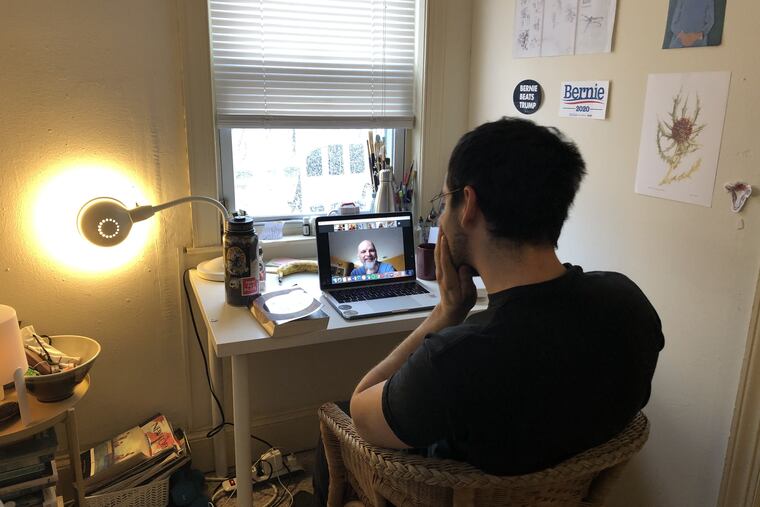As coronavirus forces colleges to move online, some give students option of ‘pass/fail’ grades
Professors are figuring out how to connect to their students online. Some are even singing them songs, or offering lessons from their garage.

As colleges have moved to remote instruction, some are recognizing the transition might not be smooth and are allowing students to earn just a pass or fail rather than the traditional letter grade.
How each is making that change varies, but the goal is the same: making sure grade point averages aren’t unfairly harmed by less-than-ideal learning conditions.
The University of Pennsylvania has given students until April 13 to decide on a “pass/fail” option for one or more courses.
“We know that many of you have concerns about the shift to remote learning and the stresses of this unexpected global situation," Penn leaders wrote.
Some universities, including Rowan in New Jersey, will allow students to decide after they see their grades. Students there will have seven days to choose pass or no credit. “Pass” connotes a grade of "D" or higher for undergraduates; for graduate students, guidelines may fluctuate.
Other schools, including Lehigh University in Bethlehem and Haverford College, have announced similar flexibility.
» READ MORE: More colleges move to, plan for online classes as coronavirus spreads
The decisions come as students expressed concern, some even starting petitions. Arielle Gedeon, a junior and president of the Rowan Student Government Association, wanted students to have a choice.
“To only do pass/fail doesn’t meet the needs of all students,” said Gedeon, 20, shortly after she talked with administrators.
Gedeon, a radio, television, and film major, said she wants letter grades.
Colleges have approached the move to online differently. Some have given faculty days or weeks to prepare; Temple jumped right in last week.
“Everybody is doing their best,” said Steve Newman, faculty union president. “Obviously, conditions are not optimal.”
Faculty are concerned about students who might not have adequate access to internet or who have lost jobs and are struggling to live, he said.
Universities also have had to deal with technological hiccups and the detachment faculty and students might feel communicating over webcams or discussion boards.
For some students, it hasn’t been bad.
“I kind of like it,” said Cindy Chen, a Temple sophomore, who is taking six classes from her Philadelphia apartment. “It’s nice to just chill a little bit.”
She said it was a little difficult at first accessing classes over Zoom, a video conferencing tool. It’s new for faculty — and for students, she said. "We’re learning it together.”
» READ MORE: Two college students — one stuck in Wuhan, one who made it back — on how coronavirus is affecting their lives
Still, she thinks Temple should give students a choice of grades or pass/fail. Temple hasn’t decided yet.
“A lot of my friends are getting straight A’s,” she said, “but I also know friends who are kind of struggling with it.”
Jacob Hershman, 22, a Penn senior and English major, said he’s fortunate to have only three elective courses this semester.
This week, he took his first class from his off-campus Philadelphia apartment. It’s called Forest World, which rethinks, through literature and film, humanity’s relationship to the forest. The class of 20 went pretty smoothly, he said.
“I don’t think the word forests came up once,” he said, noting students wanted to talk about the pandemic and the effect it had on them.
His professor, Simon Richter, said students needed to reestablish their connections with him and each other.
“People wanted to know how other people were doing … what are their anxieties and what are they doing that was helping them?” said Richter, a professor of Germanic languages and literature.
At Millersville University in Lancaster County, meteorology professor Alex DeCaria has prerecorded lectures for students to watch so they can use virtual class meetings for conversation and questions.
He’s never been a fan of online teaching, because he likes to read students’ body language for clues on whether they understand. But he’s making the best of it and even wrote a song to the tune of Eric Carmen’s “All by Myself” and posted a video of himself singing it.
“A month ago, I didn’t need a microphone,” DeCaria sings on the YouTube video, filmed in his basement. “A Zoom account was an unknown. Those days are gone.”
“It was very heartfelt,” he said. “I miss my students."
Lehigh provost Pat Farrell is making short videos for students from his messy garage. “Glimpses of your reality … might help foster interpersonal connection,” he said in a message to faculty.
Some professors wonder how they will duplicate science labs and art studio courses online.
At Muhlenberg College in Allentown, they’re finding ways, said Lora Taub, dean of digital learning.
A sculpting professor asked students to use materials at home, such as cardboard, tape, and paper, to make “wearable” gear for what he called “the zombie apocalypse.”
“What he needs his art students to know how to do is use their creativity and capacity as artists to interpret the world as it is in the moment,” she said, “and then to offer their creations to help others make meaning in uncertain times.”
Taub advised faculty not to conduct all their classes on Zoom at or for the same time they would have met in person. Use Zoom, she advised, for shorter periods to build a sense of presence, and then rely on other technology, including email, Google Docs, and discussion boards.
Muhlenberg had the advantage of moving some classes online six years ago and professors who know how to do it.
“Every department has a local expert to provide peer support,” she said. “That faculty leadership in a transition has made all the difference.”